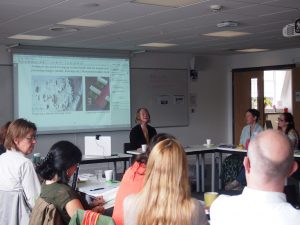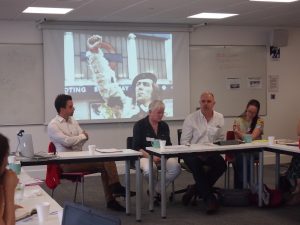On 21 June 2016, LSE London hosted the sixth seminar of the ESRC funded project, Collaborative Housing and Community Resilience, a knowledge exchange seminar series. This seminar series reflects collaboration between the UK Cohousing Network and six UK universities; Lancaster, Leeds, London School of Economics, Newcastle (principal applicant), Nottingham, and Sheffield.
The seminar was livestreamed and recorded; the event’s programme can be accessed here and the YouTube recording can be accessed here.
During the event, we also launched a film summarising the observations, results, and outcomes of action research that looked at how cohousing might address the UK housing crisis. Click here to view the film.
The seminar was followed by a Parliamentary launch of our report on 22 June 2016.
This final event in the series reflected on the factors that enable or limit the mainstreaming of cohousing in urban development settings. In particular, it sought to critically address questions regarding knowledge transfer between projects and the ‘professionalisation’ of the collaborative process between communities and expert partners. We discussed:
and expert partners. We discussed:
- Under what conditions does knowledge transfer take place and flourish?
- Can collaboration between groups and professionals take place without undermining grassroots autonomy and creativity? What mechanisms can be established to ensure this balance?
- How can the community-led and collaborative housing sectors influence policy?
After introductions from Helen Jarvis, Kath Scanlon, and Melissa Fernández, we began by hearing about two European countries where co-housing has been notably successful: the Netherlands, from the perspective of co-housing professional, Anna Dijkhius, from The Dutch Federation of Intergenerational Intentional Communities; and Germany, from the perspective co-housing resident and activist, Michael La Fond, from id22: Institute for Creative Sustainability. Anna shared with us three useful documents for our use: 1) Cohousing in the Netherlands, 2) Designing cohousing, 22 things to consider, and 3) Collective housing in the Netherlands: Centraal Wonen Delft. Michael also shared with his PPT presentation, which can be viewed here. These presentations were followed by two panels.
The first panel involved a discussion on finance and the barriers to funding and development and was led by:
- Martin Field, Senior Researcher, University of Northampton
- David Mullins, Professor of Housing Policy, Birmingham University
- Anna Kear, Executive Director, UK Cohousing Network (Click here to view the PPT presentation)
- Andrea Jones, University of Sussex, Sea City Coop HA, & Good Health Projects Ltd
In the second panel, we heard from UK-based co-housing practitioners, designers, and researchers on their experiences in the field and the constraints and opportunities they identified for development at the intersection of co-design, urban planning, and community building. They were asked to suggest ‘game-changers’ that could lead to a shift in the policy paradigm for cohousing.
 Patrick Devlin, Pollard, Thomas Edwards Architects (PTEa).
Patrick Devlin, Pollard, Thomas Edwards Architects (PTEa).- John Killock, Independent researcher and architect (Click here to view the PPT presentation)
- Maria Brenton, OWCH project consultant; UKCN board member and Ambassador of Senior Cohousing
- Louise Cannon, 2016 Winston Churchill Fellow, Award Manager @UnLtd and @CloreSocial Fellow
The final session of the day was a workshop discussion with participants to gather feedback on our project, to ask where research agendas and practice could be enhanced, and to identify the key policy requirements for moving the sector forward. This discussion informed the team’s presentation at the Parliamentary Launch on 22 June of our report.
Click here to watch a recorded video of our live stream.
Our final report titled Cohousing: Shared Futures has now been published and can be accessed and downloaded here.
The LSE’s press release, Simplify setting up cohousing communities say housing experts, can be found here. The press release has been shared by LocalGov and Building Construction Design.
Related LSE Projects and Links
This project relates to the Alternative Housing stream of our HEIF 5 – Housing in London: Addressing the Supply Crisis research project, where we produced the following associated film: Lessons from a visit to three alternative housing sites in south London
Click here for an archive of the Housing in London: Addressing the Supply Crisis project.






2 Comments